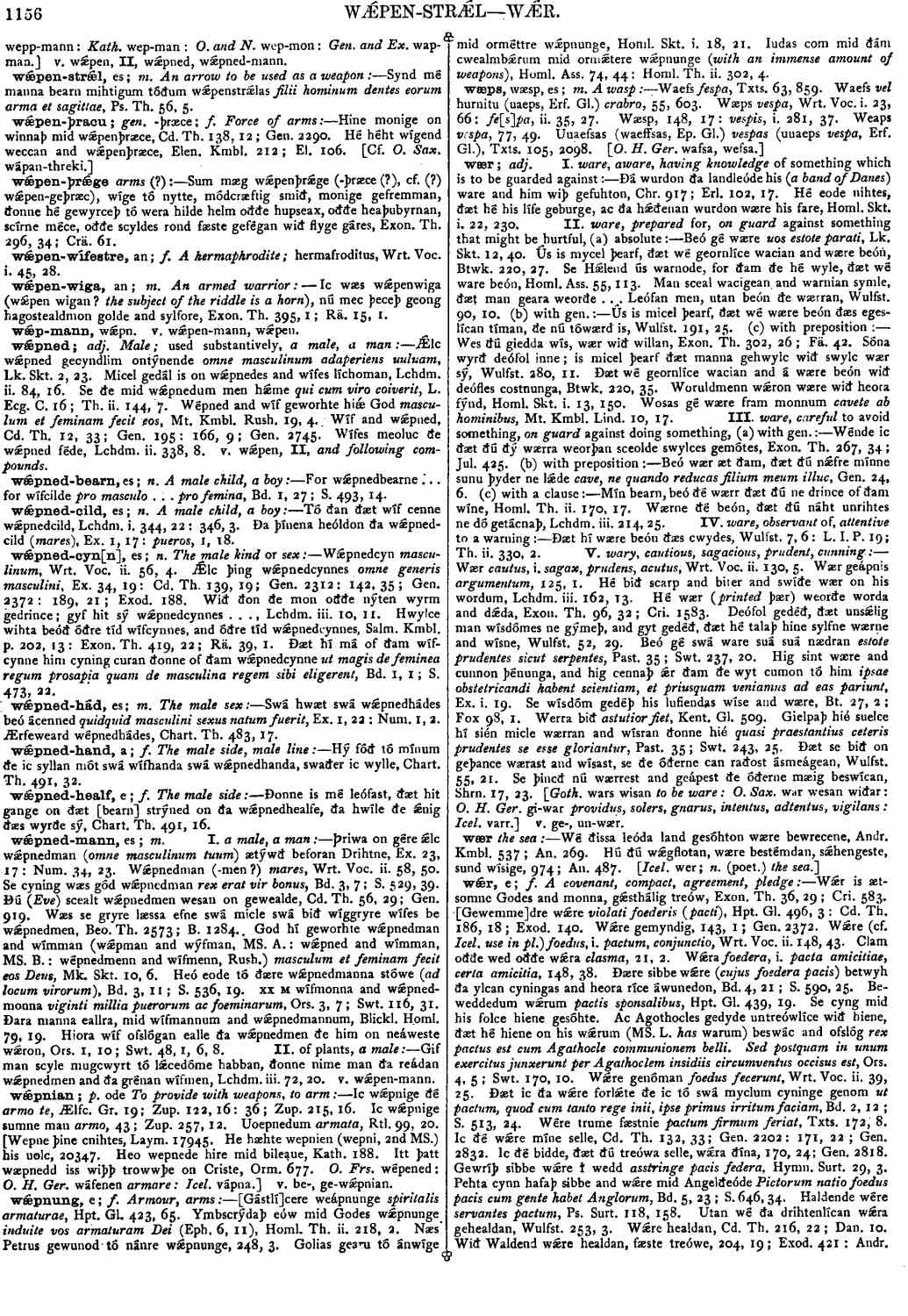wær
- adjective
-
Ðá wurdon ða landleóde his (
a band of Danes
) ware and him wiþ gefuhton,- Chr. 917; Erl. 102, 17.
-
Hé eode nihtes, ðæt hé his lífe geburge, ac ða hǽðenan wurdon wære his fare,
- Homl. Skt. i. 22, 230.
-
Beó gé wære
uos estote parati,
- Lk. Skt. 12, 40.
-
Ús is mycel þearf, ðæt wé geornlíce wacian and wære beón,
- Btwk. 220, 27.
-
Se Hǽlend ús warnode, for ðam ðe hé wyle, ðæt wé ware beón,
- Homl. Ass. 55, 113.
-
Man sceal wacigean and warnian symle, ðæt man geara weorðe . . . Leófan men, utan beón ðe wærran,
- Wulfst. 90, 10.
-
Ús is micel þearf, ðæt wé wære beón ðæs egeslícan tíman, ðe nú tówærd is,
- Wulfst. 191, 25.
-
Wes ðú giedda wís, wær wið willan,
- Exon. Th. 302, 26; Fä. 42.
-
Sóna wyrð deófol inne; is micel þearf ðæt manna gehwylc wið swylc wær sý,
- Wulfst. 280, 11.
-
Ðæt wé geornlíce wacian and á wære beón wið deófles costnunga,
- Btwk. 220, 35.
-
Woruldmenn wǽron wære wið heora fýnd,
- Homl. Skt. i. 13, 150.
-
Wosas gé wære fram monnum
cavete ab hominibus,
- Mt. Kmbl. Lind. 10, 17.
-
Wénde ic ðæt ðú ðý wærra weorþan sceolde swylces gemótes,
- Exon. Th. 267, 34; Jul. 425.
-
Beó wær æt ðam, ðæt ðú nǽfre mínne sunu þyder ne lǽde
cave, ne quando reducas filium meum illuc,
- Gen. 24, 6.
-
Mín bearn, beó ðé wærr ðæt ðú ne drince of ðam wíne,
- Homl. Th. ii. 170, 17.
-
Wærne ðé beón, ðæt ðú náht unrihtes ne dó getácnaþ,
- Lchdm. iii. 214, 25.
-
Ðæt hí wære beón ðæs cwydes,
- Wulfst. 7, 6: L. I. P. 19; Th. ii. 330, 2.
-
Wær
cautus, i. sagax, prudens, acutus,
- Wrt. Voc. ii. 130, 5.
-
Wær geápnis
argumentum,
- 125, 1.
-
Hé bið scarp and biter and swíðe wær on his wordum,
- Lchdm. iii. 162, 13.
-
Hé wær (
printed
þær) weorðe worda and dǽda,- Exon. Th. 96, 32; Cri. 1583.
-
Deófol gedéð, ðæt unsǽlig man wísdómes ne gýmeþ, and gyt gedéð, ðæt hé talaþ hine sylfne wærne and wísne,
- Wulfst. 52, 29.
-
Beó gé swá ware suá suá nædran
estote prudentes sicut serpentes,
- Past. 35; Swt. 237, 20.
-
Hig sint wære and cunnon þénunga, and hig cennaþ ǽr ðam ðe wyt cumon tó him
ipsae obstetricandi habent scientiam, et priusquam veniamus ad eas pariunt,
- Ex. i. 19.
-
Se wísdóm gedéþ his lufiendas wíse and wære,
- Bt. 27, 2; Fox 98, 1.
-
Werra bið
astutior fiet,
- Kent. Gl. 509.
-
Gielpaþ hié suelce hí sién micle wærran and wísran ðonne hié
quasi praestantius ceteris prudentes se esse gloriantur,
- Past. 35; Swt. 243, 25.
-
Ðæt se bið on geþance wærast and wísast, se ðe óðerne can raðost ásmeágean,
- Wulfst. 55, 21.
-
Se þincð nú wærrest and geápest ðe óðerne mæig beswícan,
- Shrn. 17, 23.
Bosworth, Joseph. “wær.” In An Anglo-Saxon Dictionary Online, edited by Thomas Northcote Toller, Christ Sean, and Ondřej Tichy. Prague: Faculty of Arts, Charles University, 2014. https://bosworthtoller.com/34410.
Checked: 0